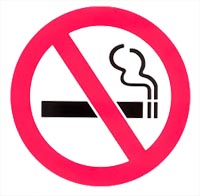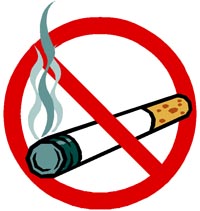NO SMOKING AT ALL! AT BRIDLINGTON HOSPITAL..FROM MARCH 2005?

It will not please many who visit the hospital; visitors who smoke and receive bad news or the people who just cannot give up this habit, whilst many including my-self agree that a, No-Smoking policy within the hospital is a good idea, on the subject of Smoking Outside; an open mind as to be brought in for Visitors, Patients and Staff who wish to continue Smoking; at the moment, seats ash-trays and bins are supplied and provided in designated areas for people to sit with patients etc. I have spoken to a great number of people and have been met with a mixed response; quoted: "Freedom of Rights"! & "Freedom of Speech"!...once again are people, visitors, staff and patients not aloud to have a say in this major change, we ask? Do the Trust make all the decisions without notification.
Tips on implementing and enforcing a No-Smoking Policy ....."Correctly"
- Remind customers of your policy at every opportunity, i.e. through transmitting frequent tannoy messages, staff badges, signs, and by presenting on any promotional material.
- Display information about your policy and leaflets about passive smoking.
- Display information on the support available to smokers wanting to quit.
- Brief staff on how to enforce the policy.
- If appropriate position ashtrays outside all entrances.
- Remove all ashtrays from the smoke free areas.
- Display no-smoking signs inside and outside the venue.
- Launch your policy publicly (No smoking day is an ideal time to do this) and celebrate the day with competitions, local speakers and local radio.
- Involve the media; get as much publicity as you can.
- Make your policy part of your marketing strategy, feature it on advertisements, website etc.
- Monitor customer response to the implementation of your no-smoking policy.
- Seek advice from Staffordshire Smoke-free Alliance.
What is No Smoking Day?
Held on the second Wednesday of March each year, and now in its 19th year, No Smoking Day helps people across the UK who want to stop smoking. The campaign encourages and assists smokers to give up, and publicises the many sources of help available to people. Each year over a million smokers join in the day, while an estimated 40,000 actually quit.
What are the health risks of smoking?
The much-publicised effects of smoking include increased risk of heart disease, lung cancer and asthma. However, smoking also causes dull skin and wrinkles. The reduced amount of oxygen getting to the skin accelerates ageing, and makes the skin look sallow. And while many smokers believe that cigarettes help them to cope with stress, scientific research has shown that anxiety levels actually decrease after giving up.
Smoking facts and figures
- About 13 million adults in the UK smoke cigarettes.
- Of all men in the UK, 29% are smokers. Out of all women in the UK, 28% are smokers.
- Nearly 30 years ago, almost half the UK population were smokers.
- Today, less than one-third of the UK population smokes.
- According to 1995 figures, smoking accounts for one in five of all deaths in the UK.
- Adult smoking rates vary across the country. In East Anglia, 25% of the population are smokers, in the North 31%, Scotland 32%, Wales 27%, Northern Ireland 29%.
Planning to give up smoking?
A few tips on quitting:
- Set a date and time to stop, and stick to it.
- Talk to your doctor or pharmacist about whether any of the proven drug treatments might suit you.
- Find out if there is a stop-smoking clinic near you.
- Enlist the help of your friends and family.
- Avoid the situations in which you used to reach for a cigarette.
- If you need to, ease the withdrawal symptoms with nicotine patches or gum.
What help is available to quit?
NHS Stop-smoking Centres are free, and operate all over the UK. They have specially trained staff who can advise you on the best way to stop smoking. Nicotine Replacement Therapy (NRT) products such as patches, gums, nasal sprays and inhalators are available from pharmacists, who can also advise on how to use them properly. There are also a number of free national helplines in England, Scotland, Wales and Northern Ireland, funded by the NHS, where specialist counsellors can discuss the process of quitting smoking.
Helplines: TO GIVE UP SMOKING.
England: NHS Smoking Helpline - 0800 169 0 169
Scotland: Smokeline - 0800 84 84 84
Wales: NHS Smokers Helpline - 0800 169 0 169
Northern Ireland: Smokers Quitline - 02890 663281
Would you like to send a donation today to: Cancer Research
To make a gift by post, please send your donation to:
Cancer Research UK
FREEPOST NAT 16919
Hellaby
S98 1XL
Include your Name, Address & Telephone Number

HERE IS A REPORT BY: "ASH"
Most smokers are sick of smoking and want out according to a new report based on a survey commissioned by ASH and the No Smoking Day charity [1]. 83% of smokers say they would not smoke if they had their time again and list five main reasons health, money, addiction, disgust and social stigma. The actual words used by smokers [2] show a deep level of anxiety and despair that contrasts sharply with the image promoted by tobacco companies. The tobacco companies want to portray smoking as carefree, chic and independent, but the reality is that most smokers would not smoke if they had an unfettered free choice. The truth is that addiction to nicotine denies free choice.
A new web site www.sickofsmoking.com has been set up by No Smoking Day to give the 83% of dissatisfied smokers a platform to express their views. For too long, the voice of smokers has been captured and misused by tobacco companies and their front groups.
Backed by the survey, we give six reasons to quit:
1. Health on average each cigarette takes 11 minutes off your life. Smoking causes 50 diseases of which 20 are fatal. You have a one in two chance of dying from smoking if you carry on.
2. Money a 20 per day habit costs about £1,600 per year. Even buying smuggled cigarettes would cost £1,000 per year. The average smoker contributes £800 in tax to the government each year.
3. Addiction you may not be ill yet, but what if you can't stop when you want to? The Royal College of Physicians states that cigarettes are addictive on a par with heroin and cocaine. Each year of smoking makes the addiction deeper and the difficulty of quitting greater.
4. Control smoking is demanding on time and energy. Cigarette breaks, buying cigarettes, finding places to smoke, dealing with smells and dirty clothes.
5. Stigma passive smoking has meant smoking is increasingly marginalized a trend that is unlikely to reverse.
6 . It works! quitting is sometimes difficult, but never impossible. The benefits start as soon as you stop, and the sooner you stop the less at risk you are. It is never too late people still benefit from quitting in their 70s, and benefit a lot if they are younger.
Based on experience, we offer five tips on how to quit:
1. Pick a date even if you don't quit on No Smoking Day itself, use the day to decide when you will giving yourself enough time to prepare.
2. Prepare get as much information together as you can, so that you know what to expect and all the tricks that help people deal with withdrawal. If you are worried about putting on weight think about diet and exercise and remember that any weight gain is likely to be temporary. Use the ASH web site resources .
3. Support get help. Ring the NHS Smokers' help line (0800 1690169) or Quit (0800 002200). Enrol a local smoking cessation clinic or talk to the doctor. Support starts at home stop with your partner and with the backing of your family and friends.
4. Medication use nicotine patches, gum or other products or ask your doctor about Zyban. These treatments help to deal with cravings.
5. Avoid temptation don't go to the pub three days after quitting and avoid smoky environments.